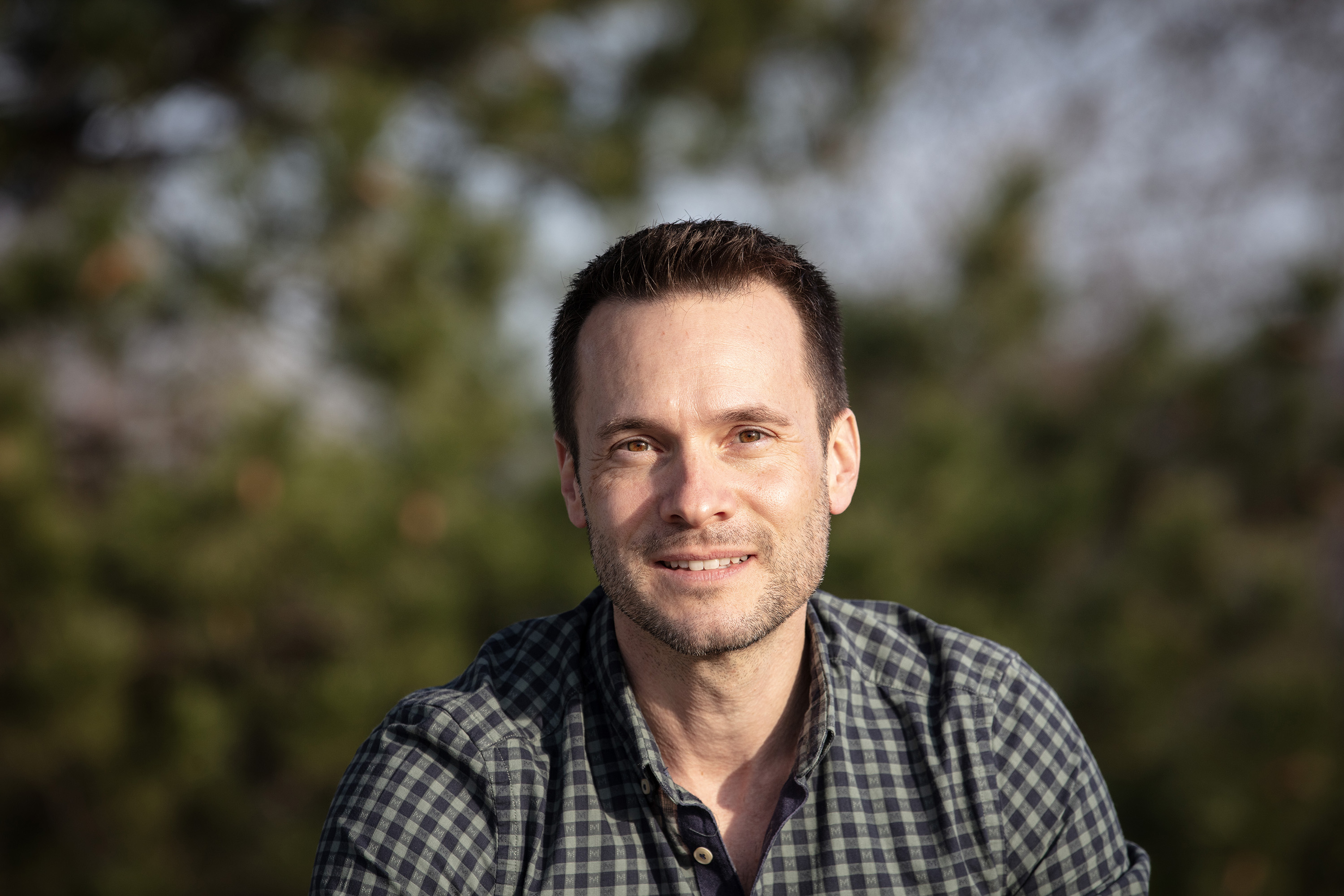
Patrick Hässig: from Swiss radio to hospital – and into parliament

Since autumn the nurse and former radio presenter Patrick Hässig has sat in the Swiss House of Representatives for the centrist Liberal Green Party.
“Ever since I started working in nursing, I’ve had an issue that I want to get actively involved in politics,” Hässig says. He is sitting in the cafeteria of the Zurich hospital where he made the decision to enter politics. This is where he completed his training, worked for his first few years as a nursing specialist and experienced everyday hospital life and the working conditions in nursing for himself.
In October the 45-year-old was elected to the House of Representatives for the Liberal Greens. To do so, he cut back professionally and reduced his workload as a carer. Now he wants to leave his mark on healthcare policy in the Swiss parliament.
The swift and complete implementation of the care initiative, which Swiss voters approved in November 2021, is crucial. “There is a certain vacuum. Only a few politicians are standing up for the concerns of the care sector,” he says.
Last October, Swiss voters chose 56 new representatives to join the federal parliament in Bern. The Swiss People’s Party, the Centre Party, and the Social Democratic Party made the biggest gains in the 2023 election and sent the greatest number of new faces to parliament. The Green Party, on the other hand, suffered heavy losses and sent no new representatives to Bern.
In this series SWI swissinfo.ch profiles some of these new parliamentarians as they take their first steps in federal politics.
Hässig also wants to tackle the two problem children of healthcare policy: high health insurance premiums and healthcare costs. His proposal: hospitals for outpatient treatment, i.e. without overnight stays, should replace certain 24-hour operations. “This would save costs and introduce a two-shift system, which would relieve the burden on staff.”
Many people in Switzerland are familiar with the voice of the new parliamentarian. The “country’s most famous nursing expert”, as some media have labelled him, was himself behind the microphone as a radio presenter for a long time. For many years as the morning voice of the private stations Radio 24 and Radio Energy.

Six years ago he decided it was enough. At the age of 38, Hässig swapped his microphone for a stethoscope and began training as a carer. The result of an early midlife crisis? Hässig laughs. “Some people buy a Harley-Davidson and let their hair grow; I started a new job. I believe that people need change in their lives.”
He himself is not someone who can do the same job for 40 years. On the other hand, he is firmly rooted locally: the self-described “Zurich native through and through” has spent only a single year of his life outside his hometown.
Steep political career
2022: elected to the city parliament. Beginning of 2023: elected to the cantonal parliament. End of 2023: elected to the House of Representatives. Did Hässig’s fame as a radio presenter help his career take off?
He says the “radio past and the name Hässig helped”. Locally, however, he believes the strong connection with Zurich was more decisive. He sees the situation of nursing staff, which has concerned large sections of the Swiss population since the Covid pandemic, as another factor.
After his rapid political rise, Hässig is now taking things slowly in the federal parliament. “Warte, luege, lose, laufe” he says – the verse that children in German-speaking Switzerland use to remember the correct behaviour when crossing the road. Wait, look, listen, walk. “The winter session was ‘warte’, in the meantime came ‘luege’, in the spring session I’ll continue to listen and perhaps already walk a little – I’ll then really get going in the summer session.”
The communications professional openly admits his insecurities. He says his first day as a federal parliamentarian last December “pulled the rug from under his feet”. “It’s an office with a lot of responsibility. I have great respect for this task.” He adds that the volume was unusual. “You almost have to read lips to understand what the person at the podium is saying.”
As in the city and cantonal parliaments, Hässig is now also a member of the House of Representatives’ security policy committee. One issue he wants to tackle in this committee is the equal treatment of military and civilian service. Instead of a civilian alternative service, Hässig wants a free choice between the services – and compulsory service for women. “Especially now that we are fortunately making progress with equal rights at every level.” Internationally, he would like to see “greater solidarity with neighbouring countries in defence, so that we’re not left standing alone when someone from abroad stirs things up”.

When asked about Hässig, his fellow committee member from the Zurich city parliament, Stephan Iten from the right-wing Swiss People’s Party, recalls a parliamentarian who had taken a centre-right position in the areas of security and police. “When it came to transport issues, you could already feel the left-wing swing,” Iten says, adding that Hässig was “on top of his dossier”.
At the same time, Hässig was not afraid to ask questions when things were unclear. “He did his research before making a decision,” says Iten, who nevertheless describes Hässig as more of a “Schnurri”, more of an experienced speaker than a politician. This is not meant in a negative way, he explains. “He’s a person who can talk well. You can feel his talent as a radio presenter.”
Hässig has worked with Mandy Abou Shoak, among others, in the cantonal council. The politician from the left-wing Social Democratic Party says she found Hässig to be a “committed yet pragmatic politician”. He was particularly passionate about health policy issues, she says, adding that with his radio background, Hässig was “rhetorically superior” to some in the cantonal council.
Role of the Swiss Abroad
In the current spring session, Hässig took to the speaker’s podium in the House of Representatives for the first time. His topic: lowering the voting age to 16. “I think it would be great if we could get younger people involved earlier and convince them of our great system of direct democracy,” he says.

Hässig himself had his first contact with federal politics before the age of 16. “At 14, I was fascinated by the Federal Council elections and could name all [seven] government ministers in office,” he recalls.
He was particularly impressed by the appearances of the government ministers and parliamentarians on the podium, which he watched on television. “The way they communicate, the rhetoric.” His work as a carer may have shaped the content of his politics, but the former presenter can still be felt in his understanding of communication and demeanour.
In Hässig’s opinion, the Swiss Abroad have a special function: providing a critical outside view of the “Swiss bubble”. “Emigrants observe politics in their country of residence and origin more critically and draw comparisons,” he says.
Hässig is a supporter of e-voting – “if data protection is guaranteed, I’d introduce it tomorrow” – so that the Swiss Abroad “can benefit in an accessible way”, but also because he hopes it will increase voter turnout at home.
He would prefer a “60% turnout” – a level that has never been seen in elections in Switzerland in the past 50 years. But it does happen in highly polarising votes: in the heated atmosphere of the Covid pandemic the care initiative achieved a turnout of over 65% on the same voting date as the Covid Law.
The concerns of carers not only brought Hässig into politics but also prompted almost two out of three Swiss citizens to vote. Of these, 61% voted in favour of the care initiative. So Hässig’s topic appears to be moving Switzerland.
Edited by Benjamin von Wyl. Adapted from German by Thomas Stephens
Do you want to read our weekly top stories? Subscribe here.

In compliance with the JTI standards
More: SWI swissinfo.ch certified by the Journalism Trust Initiative


























You can find an overview of ongoing debates with our journalists here . Please join us!
If you want to start a conversation about a topic raised in this article or want to report factual errors, email us at english@swissinfo.ch.